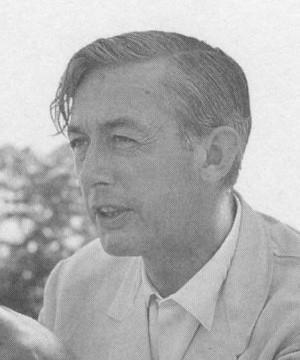Little is known about the early life of this reclusive, secretive genius of the French cinema, except that he turned to painting after graduating from high school, where he had excelled in Greek, Latin, and philosophy studies. He married at 19. In 1933 he made his entry into films as screenwriter on C'était un Musicien. The following year he directed a medium-length comedy, Les Affaires publiques, of which no print survives. He collaborated on several more scripts, including René Clair's L'Air pur (1939) before the outbreak of WWII. During the war he spent more than a year in a German prison, an experience he was later to incorporate into his film A Man Escaped (1956). Bresson prefers to dissociate himself from his early work in films and to regard his film career as really beginning with his first feature, Les Anges du Péché (1943).
Bresson occupies a unique place in French cinema. He cannot be classified with either the old guard or the New Wave but is highly respected by both for pursuing his own individual style, unperturbed by the cinema around him. "He expresses himself cinematographically as a poet would do with his pen," Jean Cocteau said of him. "His cinema is closer to painting than to photography," says Truffaut. Others see in him a philosopher with a camera, an uncompromising Jansenist rigorously preoccupied with ideas of predestination and spiritual grace.
Above all, Bresson is the complete cinema stylist whose universe remains unchanged from film to film and whose personal signature is imprinted clearly on each and every one. Of all contemporary directors, he probably comes closest to the definition of an auteur. His films are tightly constructed to the exclusion of all but the bare essence of the material he intends to explore. Nothing is allowed to interfere with his basic theme by either addition or subtraction. What he does choose to show is presented with rigorous, almost fanatic, attention to detail. But the realism he achieves is not of the kind associated with documentary films. His concern is with truth beyond mere reality, and he discovers it not in the artifacts themselves but in the inner life of the characters who are surrounded by them.
A purist, Bresson resists being influenced by the tools of other arts. He rejects the conventional plot as "a novelist's trick" and most of the time employs nonprofessional or inexperienced actors. "Acting is for the theatre, which is a bastard art," he says. To him, acting, like all other extraneous matters, is a hindrance rather than an aid in his search for inner truth. Unlike the theatre, Bresson contends, "film can be a true art because in it the author takes fragments of reality and arranges them in such a way that their juxtaposition transforms them....Each shot is like a word, meaning nothing by itself....[It] is given its meaning by its context....Acting has nothing to do with that. It can only get in the way. Films can be made only by bypassing the will of those who appear in them, using not what they do but what they are."
This emphasis on the relationship of images also accounts for the "flat" composition of Bresson's individual frames. "Painting," he says further, "taught me to make not beautiful images but necessary ones." The sound track, too, is used by Bresson not for effect but functionally, as another dimension of his universe, an extension of the world of his characters and nothing more. Bresson has made only ten feature films in nearly 30 years, yet he is one of the most discussed and revered figures in cinema today—creative, original, unique. In 1975 he published Notes sur le Cinématographe, a book-size essay expressing his ideas on filmmaking. An English translation, Notes on Cinematography, was published in New York in 1977. He shared the Grand Prix de Création at the 1983 Cannes Festival for L'Argent.
— Ephraim Katz, The Film Encylopedia
FILMOGRAPHY
Les Affaires publiques (France 1934)
Les Anges du péché / Angels of the Streets (France 1943)
Les Dames du Bois de Boulogne / The Ladies of the Bois de Boulogne (France 1945)
Journal d'un curé de campagne / Diary of a Country Priest (France 1950)
Un Condamné à Mort s'est échappé / A Man Escaped (France 1956)
Pickpocket (France 1959)
Procès de Jeanne d'Arc / The Trial of Joan of Arc (France 1962)
Au hasard Balthazar / Balthazar (France/Sweden 1966)
Mouchette (France 1967)
Une Femme Douce / A Gentle Creature (France 1969)
Quatre nuits d'un rêveur / Four Nights of a Dreamer (France 1971)
Lancelot du Lac / Lancelot of the Lake (France 1974)
Le Diable Probablement / The Devil, Probably (France 1977)
L'Argent (France 1983)
LINKS
 France Cinéma Multimédia (French-language)
France Cinéma Multimédia (French-language)
 Internet Movie Database
Internet Movie Database
 Pickpocket: review by Roger Ebert
Pickpocket: review by Roger Ebert
This page has been visited  times since 26 November 1999.
times since 26 November 1999.
